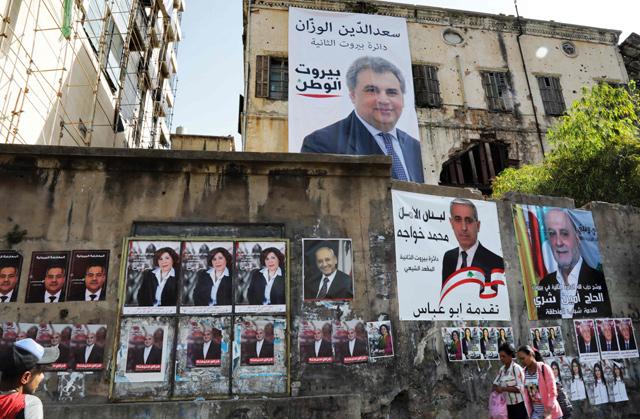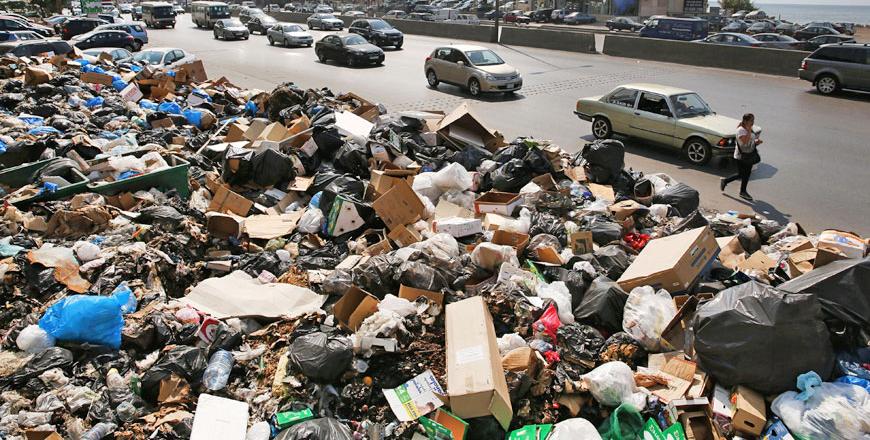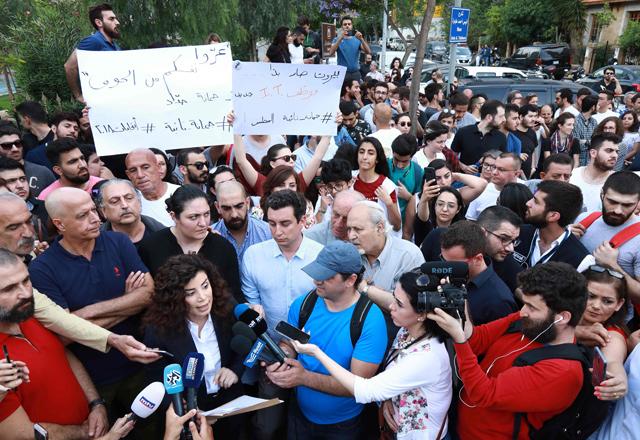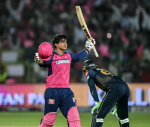You are here
Election fever hits Lebanon, nine years since last legislative vote
By AFP - Apr 19,2018 - Last updated at Apr 19,2018

This photo taken on April 3 shows campaign posters, for the upcoming Lebanese parliamentary elections, hanging in the capital Beirut (AFP photo)
BEIRUT, Lebanon — As its first parliamentary vote in nearly a decade approaches, Lebanon has been swept into campaign fever: posters on every corner, televised debates, and neighbours bickering over new electoral procedures.
Stakes are high in the long-awaited May 6 poll, the first test of Lebanon's 2017 voting law, that will carve out the country's political and economic trajectory for years to come.
Voters and candidates alike are eager for polling to start, nearly 10 years after the last parliamentary elections in June 2009.
The 128 lawmakers elected back then have extended their mandate three times, citing potential spillover from the war in neighbouring Syria and an unsatisfactory voting law.
But after years of deadlock, Lebanon's politicians agreed to elect a president, form a government and move towards a complex new ballot system, paving the way for next month's historic vote.
"It's a new electoral experience for Lebanon," said Imad Salamey, a professor of political science at Beirut's Lebanese American University.
The next parliament will select Lebanon's future prime minister, and legislate on major social and economic issues, while attempting to keep sectarian tensions in check.
"The stakes in this election are quite high due to the delicate balance of power between the different sectarian groups in the country," Salamey said.
The country of just over 4 million is governed by a power-sharing agreement that leaves little to chance, with parliament equally divided between Muslims and Christians then further split among different sects.
Lebanon 'needs change'
But the new electoral system, the frustration of young voters and the candidacy of scores of independents have sparked hope for something different.
"This country needs a change. I've been complaining about it for years, so not doing anything is not a solution," said Ingrid Hag, 25.
The communications consultant, who will be casting her ballot for the first time, said she had yet to decide how she will vote, but wants a government that cares about environmental issues, women's rights and reliable public services.
Across the country, 597 candidates running on 77 lists have launched their campaigns with Oscars-style ceremonies and huge billboards dominating highways.
In every neighbourhood, images of the incumbent political elite, like Prime Minister Saad Hariri, stare down first-time hopefuls.
Television channels are offering candidates pricey media packages for up to $6,000 per minute of airtime and have launched slick shows to explain the new ballot-casting process.
In the past, voters could individually pick candidates for each seat in their district.
Under the new law, they choose among the lists, but can also cast an extra preferential vote for a specific candidate.
The law replaces a majoritarian system with a proportional one and allows Lebanese expatriates to vote abroad for the first time — some 82,000 have registered to do so.
'Pragmatic' list-making
The new list system has further ruptured Lebanon's bipolar political class, long split between the pro-Iran March 8 and pro-Saudi March 14 alliances.
Now parties are being "pragmatic", said Salamey, reaching across the aisle to form mutually-beneficial electoral blocs in some districts whilst opposing each other elsewhere.
"It's based on each candidate, how many votes he or she can get to the list and accordingly alliances are formulated," he said.
The only party not to ally with rivals is the powerful Tehran-backed Hizbollah, popular across Lebanon's south and centre but considered a "terror" group by the US.
But the new law has also prompted candidates outside Lebanon's traditional political class to join forces, and attracted a record number of women — including writer and activist Joumana Haddad.
Running on the Libaladi (For My Country) list, Haddad pledges to end religion's influence on issues like marriage and inheritance.
"With the civil status law, there will be more justice, less sectarianism and more equality," she told AFP.
"This new electoral law, despite its many flaws, allows a tiny percentage of independents to get to the parliament. This is the tiny percentage we are trying to work on," said Haddad, 47.
Related Articles
BEIRUT — Every few weeks for the past year, Lebanon's parliament has met, exchanged pleasantries, and made the same announcement: that it ha
BEIRUT — To the casual visitor, Lebanon may seem like a tiny slice of Mediterranean modernity and coexistence in a turbulent region plagued
BEIRUT, Lebanon — A secular coalition that ran in Lebanon’s parliamentary elections said on Tuesday it will legally challenge the defeat of

















